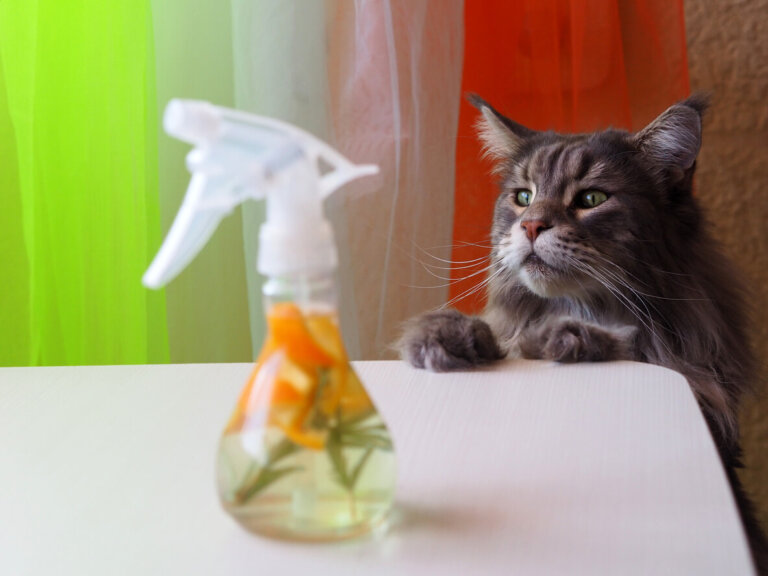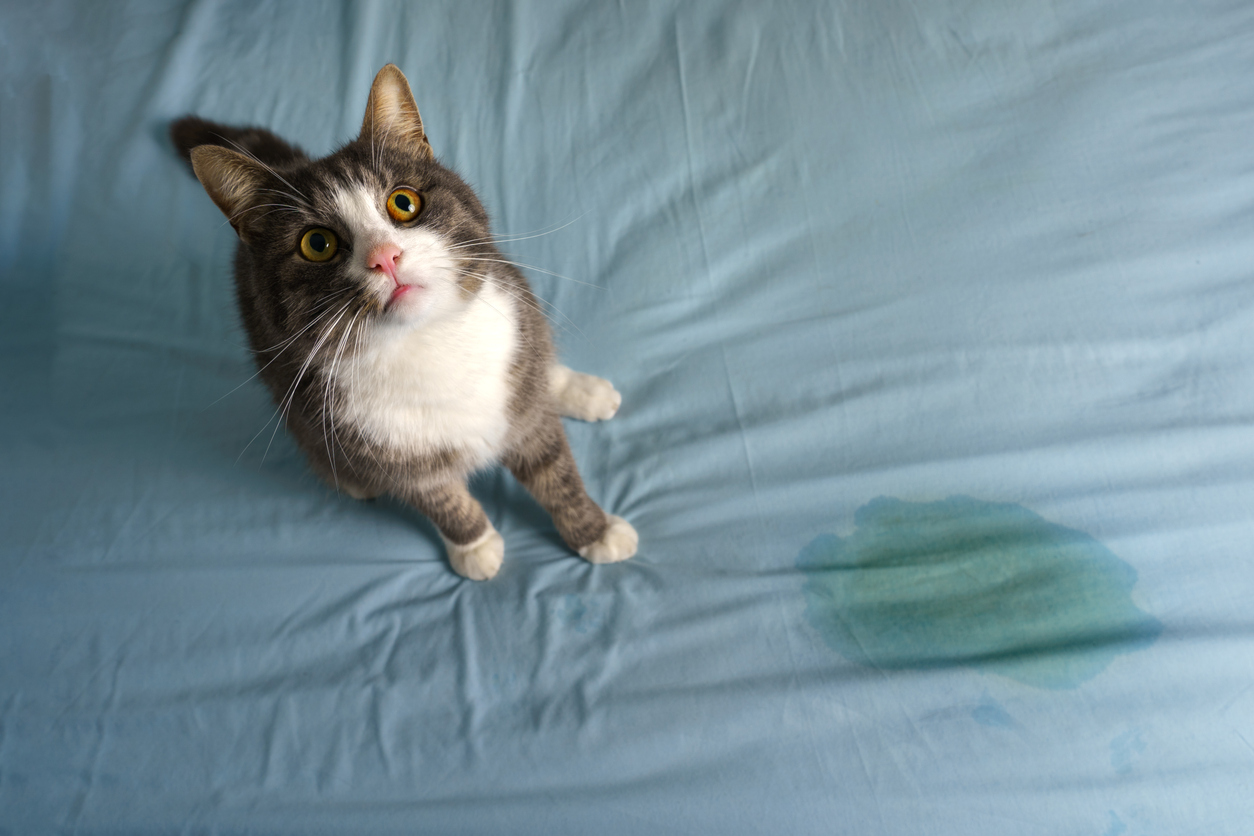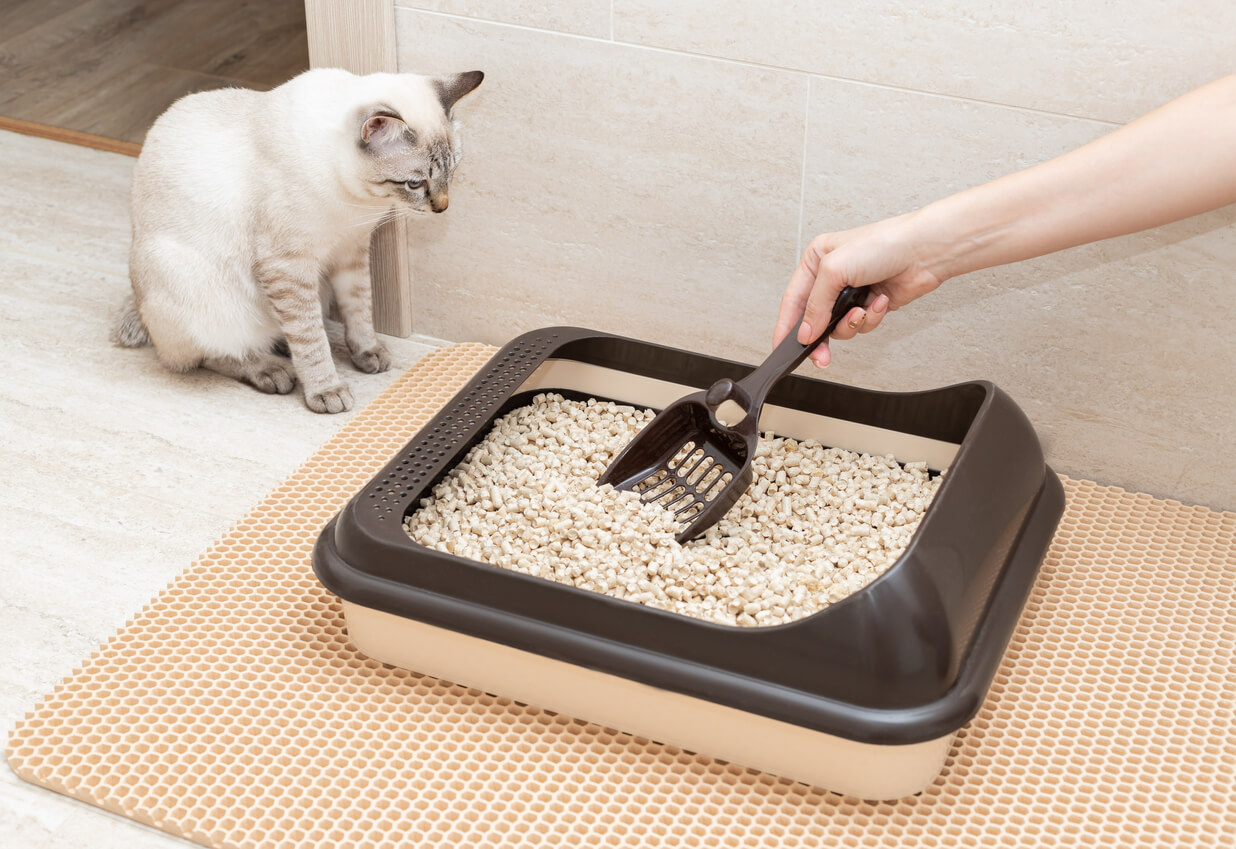Homemade Repellents to Keep Cats from Urinating in Your Home


Reviewed and approved by veterinary doctor Luis Gabriel Garcia Trompa
Do you have a feline problem? Whether they’re your own or someone else’s, cats can urinate in spaces in your home where you don’t want them to. Not only can they damage your furniture and flooring, but they can also leave an unpleasant odor. Therefore, we’ll present you with a number of homemade cat repellents that you can try for yourself.
All of them are very easy to make with natural elements, such as citrus peels, essential oils, and aromatic herbs. Therefore, you won’t have to worry about doing any harm to the animals with them.
We’ll also offer you information on why cats urinate in certain places, what attracts them, and other tips that will prevent you from having to clean up any messes outside of the litter box. Don’t miss it!
Why do cats urinate in certain parts of your house?
Before we get into homemade cat repellents, it’s good to know where the favorite places for cats to urinate are and why they do it. Also, if you know their preferences, you’ll know what measures to take and where to place the homemade cat repellents. There are basic reasons why they urinate or spray in different parts of the house:
- Illness
- Stress or anxiety
- Availability for mating
- The presence of more than one cat in the house
- Very young or geriatric animals
- Problems with the litter box, such as its location, texture, odor, and cleanliness
First of all, it could be that the cat suffers from some illness, such as a urinary tract infection. In such cases, it may also appear ill or have other symptoms, such as the following:
- Vomiting
- Excessive licking
- Blood in the urine
On the other hand, if your cat isn’t using their litter box, it may be because it’s unhappy. Any change in the environment or in the family’s routine can stress the animal out and cause it to change its habits. Some causes include poor litter box maintenance, a move, or changes in the interaction between the cat and its caregiver.
When animals aren’t neutered, they may spray urine on vertical surfaces to indicate readiness for mating or to mark their territory. According to the Journal of Feline Medicine and Surgery, they often do this in significant places, such as on belongings, the laundry room, near doors and windows, or on new items you introduce to the home.
If you notice any unusual symptoms in your cat or a sudden change in habits, the best thing to do is consult a veterinarian.

Cat repellent options
Sometimes, you want to keep away stray cats in your neighborhood that come to your yard and do their business. In other cases, you may have a pet cat that urinates or sprays outside the litter box, and you want it to stop. These cases are more common than you think.
Now that you know the possible causes, here’s a step-by-step list of how to make many types of cat repellents that’ll help you get cats to avoid certain areas of your home. These are all non-toxic homemade preparations that will dissuade them from urinating in the places where you put them.
Most of them are homemade cat repellents that include odors that cats hate. This is because their sense of smell is more sensitive than that of people, and they can perceive some substances with greater intensity. That’s why they dislike strong aromas, such as citrus. Now, keep reading to discover how to prepare them!
1. Vinegar spray
To keep cats away from certain areas of the house, you should opt for fragrant elements, as they won’t attract the felines’ sense of smell. One of them is vinegar, and here we’ll teach you how to prepare this very simple homemade repellent with this ingredient. Follow the step-by-step instructions below.
Ingredients
- ½ cup of water (120 milliliters).
- ½ cup of white vinegar (120 milliliters).
- One glass or plastic spray bottle (that holds at least 1 cup or 250 milliliters).
Preparation
- To make this cat repellent, take the spray bottle and place the white vinegar inside it.
- Then, do the same with the water. It can be tap water.
- Next, close the spray bottle and shake it to mix the components.
- You can now spray it once a week around the areas where cats tend to urinate.
Vinegar can also be used to eliminate possible urine odor. Be careful when using it on wooden floors or furniture and certain fabrics, as it can leave stains.
2. Cotton balls with essential oils
Lemon, orange, lavender, mint, or citronella are ideal for repelling cats. For that reason, if you have any essence around the house with these scents, this is the perfect time to use them.
Ingredients
- Trays (optional).
- Cotton balls (quantity needed).
- Lemon, orange, lavender, mint, or citronella essential oil.
Preparation
- Take as many cotton balls as you consider sufficient.
- Then, take the essential oil of your choice and wet the cotton balls with it until they’re impregnated with its aroma.
- Finally, place them in the places where cats usually urinate, such as around dirty clothes or the bed where they pee. You can leave them on trays to avoid stains. Repeat when they stop giving off odor.
3. Citrus peels
Looking for a natural and very simple cat repellent? Don’t throw away lemon, orange, grapefruit, lime, or tangerine peels. Instead, take the opportunity to consume these fruits and use their fresh peel as follows.
Ingredients
- Fresh lemon, lime, orange, grapefruit, or tangerine peels (quantity needed).
Procedure
- Peel the citrus fruits of your choice. The amount of peels to use will depend on the number of places where you need to place them.
- Then, place them in the areas where cats usually urinate. Repeat the process when they have dried.
4. Citrus spray
Instead of placing fresh peels around your home, you can make a spray similar to the cat repellent above. Follow these simple steps.
Ingredients
- 7 ounces of water (200 milliliters).
- A fire-resistant pot.
- One glass or plastic sprayer (over 200 milliliters).
- Citrus fruit peels, such as lemon, orange, tangerine, grapefruit, or lime (50 grams).
Procedure
- First, place the water in the pot and bring it to a simmer on the stove.
- Then, place the peels of the citrus fruit in the water. Let it boil for 20 minutes. When the time is up, turn off the heat.
- Once the mixture is cool, transfer the liquid to the sprayer, leaving the peels out.
- When it’s ready, you can spray it once a week on the areas where the cats urinate.
As with vinegar, citrus can stain certain woods and fabrics. For this reason, you’ll need to be careful when using the sprayer.
5. Herb spray
If you have cooking herbs or any aromatic plants in your garden, you can use them for this other cat repellent. As with citrus, their strong smell is another thing that drives cats crazy because they hate it. It’s very easy to make, although it takes a little more time.
Ingredients
- 7 ounces of water (200 milliliters).
- A fire-resistant pot.
- One glass or plastic sprayer (at least 200 milliliters).
- Some aromatic herb, such as lavender, thyme, eucalyptus, basil, mint, or rosemary (10 grams).
Procedure
- To begin, place the water in a pot and heat it on the stove until it boils. Then, turn it off.
- Next, take the herb of your choice and place it in the water. Let it sit there until it cools down.
- Finally, transfer the liquid to the sprayer, without the herbs, and spray it once a week wherever the cats urinate!
6. Other ways to make a cat repellent
We’ve given you several options for homemade cat repellants to keep cats away from those areas where you don’t want them to urinate. However, there are also other ways to keep them away without the need to prepare any recipes. Some of them are the following:
- Place aromatic plants in strategic places around the house. For example, eucalyptus, thyme, basil, lavender, rue, or lemongrass.
- Use commercial synthetic repellents that don’t contain toxic ingredients.
- Sprinkle dried rue on gardens or indoor surfaces.
- Scatter coffee grounds in areas where cats frequent.
Additional measures to prevent cat urination in your home
Repellents may be enough to prevent felines from urinating in your yard or in certain areas inside the house. However, you can also take other precautions, such as the following:
- Using cat pheromones.
- Keep dirty clothes out of their reach.
- Avoid leaving food outside and clean up any leftovers.
- Neuter cats so they stop spraying.
- Cover garbage cans and secure lids.
- Place plastic mats with spikes facing up in problem areas.
- Clean up pee and feces as soon as possible to avoid attracting odors.
- Incorporate outdoor litter boxes made with wooden frames and cat litter to discourage cats from relieving themselves in the rest of the yard.
If the problem is that your cat doesn’t use its litter box, another tip is to create a calm environment to prevent it from becoming stressed and changing its habits. Also, increase the attractiveness of the box. To do this, check its availability at home, get litterboxes that are shallow and large, and clean them and change the litter regularly.
Similarly, check its location, as cats prefer their litter boxes to be in a quiet place with several exits. As a final recommendation, you can vary the amount and type of litter you use until you find one that seems more attractive to your feline friend.
Avoid cleaning surfaces or pee with ammonia or chlorine, as cats tend to associate their smell with urine depositions.

Choose the most convenient homemade cat repellents
Now that you know what the preferences of felines are when it comes to going to the bathroom, you can resort to any of the homemade cat repellents that we’ll share with you. Choose the one that best suits you and the places you want to keep them away from.
Now, if you notice that your cat has changed its habits and suddenly stops using its litter box or shows other symptoms, go to a veterinarian. Your pet may be urinating in different parts of the house as a result of stress, illness, or discomfort.
Do you have a feline problem? Whether they’re your own or someone else’s, cats can urinate in spaces in your home where you don’t want them to. Not only can they damage your furniture and flooring, but they can also leave an unpleasant odor. Therefore, we’ll present you with a number of homemade cat repellents that you can try for yourself.
All of them are very easy to make with natural elements, such as citrus peels, essential oils, and aromatic herbs. Therefore, you won’t have to worry about doing any harm to the animals with them.
We’ll also offer you information on why cats urinate in certain places, what attracts them, and other tips that will prevent you from having to clean up any messes outside of the litter box. Don’t miss it!
Why do cats urinate in certain parts of your house?
Before we get into homemade cat repellents, it’s good to know where the favorite places for cats to urinate are and why they do it. Also, if you know their preferences, you’ll know what measures to take and where to place the homemade cat repellents. There are basic reasons why they urinate or spray in different parts of the house:
- Illness
- Stress or anxiety
- Availability for mating
- The presence of more than one cat in the house
- Very young or geriatric animals
- Problems with the litter box, such as its location, texture, odor, and cleanliness
First of all, it could be that the cat suffers from some illness, such as a urinary tract infection. In such cases, it may also appear ill or have other symptoms, such as the following:
- Vomiting
- Excessive licking
- Blood in the urine
On the other hand, if your cat isn’t using their litter box, it may be because it’s unhappy. Any change in the environment or in the family’s routine can stress the animal out and cause it to change its habits. Some causes include poor litter box maintenance, a move, or changes in the interaction between the cat and its caregiver.
When animals aren’t neutered, they may spray urine on vertical surfaces to indicate readiness for mating or to mark their territory. According to the Journal of Feline Medicine and Surgery, they often do this in significant places, such as on belongings, the laundry room, near doors and windows, or on new items you introduce to the home.
If you notice any unusual symptoms in your cat or a sudden change in habits, the best thing to do is consult a veterinarian.

Cat repellent options
Sometimes, you want to keep away stray cats in your neighborhood that come to your yard and do their business. In other cases, you may have a pet cat that urinates or sprays outside the litter box, and you want it to stop. These cases are more common than you think.
Now that you know the possible causes, here’s a step-by-step list of how to make many types of cat repellents that’ll help you get cats to avoid certain areas of your home. These are all non-toxic homemade preparations that will dissuade them from urinating in the places where you put them.
Most of them are homemade cat repellents that include odors that cats hate. This is because their sense of smell is more sensitive than that of people, and they can perceive some substances with greater intensity. That’s why they dislike strong aromas, such as citrus. Now, keep reading to discover how to prepare them!
1. Vinegar spray
To keep cats away from certain areas of the house, you should opt for fragrant elements, as they won’t attract the felines’ sense of smell. One of them is vinegar, and here we’ll teach you how to prepare this very simple homemade repellent with this ingredient. Follow the step-by-step instructions below.
Ingredients
- ½ cup of water (120 milliliters).
- ½ cup of white vinegar (120 milliliters).
- One glass or plastic spray bottle (that holds at least 1 cup or 250 milliliters).
Preparation
- To make this cat repellent, take the spray bottle and place the white vinegar inside it.
- Then, do the same with the water. It can be tap water.
- Next, close the spray bottle and shake it to mix the components.
- You can now spray it once a week around the areas where cats tend to urinate.
Vinegar can also be used to eliminate possible urine odor. Be careful when using it on wooden floors or furniture and certain fabrics, as it can leave stains.
2. Cotton balls with essential oils
Lemon, orange, lavender, mint, or citronella are ideal for repelling cats. For that reason, if you have any essence around the house with these scents, this is the perfect time to use them.
Ingredients
- Trays (optional).
- Cotton balls (quantity needed).
- Lemon, orange, lavender, mint, or citronella essential oil.
Preparation
- Take as many cotton balls as you consider sufficient.
- Then, take the essential oil of your choice and wet the cotton balls with it until they’re impregnated with its aroma.
- Finally, place them in the places where cats usually urinate, such as around dirty clothes or the bed where they pee. You can leave them on trays to avoid stains. Repeat when they stop giving off odor.
3. Citrus peels
Looking for a natural and very simple cat repellent? Don’t throw away lemon, orange, grapefruit, lime, or tangerine peels. Instead, take the opportunity to consume these fruits and use their fresh peel as follows.
Ingredients
- Fresh lemon, lime, orange, grapefruit, or tangerine peels (quantity needed).
Procedure
- Peel the citrus fruits of your choice. The amount of peels to use will depend on the number of places where you need to place them.
- Then, place them in the areas where cats usually urinate. Repeat the process when they have dried.
4. Citrus spray
Instead of placing fresh peels around your home, you can make a spray similar to the cat repellent above. Follow these simple steps.
Ingredients
- 7 ounces of water (200 milliliters).
- A fire-resistant pot.
- One glass or plastic sprayer (over 200 milliliters).
- Citrus fruit peels, such as lemon, orange, tangerine, grapefruit, or lime (50 grams).
Procedure
- First, place the water in the pot and bring it to a simmer on the stove.
- Then, place the peels of the citrus fruit in the water. Let it boil for 20 minutes. When the time is up, turn off the heat.
- Once the mixture is cool, transfer the liquid to the sprayer, leaving the peels out.
- When it’s ready, you can spray it once a week on the areas where the cats urinate.
As with vinegar, citrus can stain certain woods and fabrics. For this reason, you’ll need to be careful when using the sprayer.
5. Herb spray
If you have cooking herbs or any aromatic plants in your garden, you can use them for this other cat repellent. As with citrus, their strong smell is another thing that drives cats crazy because they hate it. It’s very easy to make, although it takes a little more time.
Ingredients
- 7 ounces of water (200 milliliters).
- A fire-resistant pot.
- One glass or plastic sprayer (at least 200 milliliters).
- Some aromatic herb, such as lavender, thyme, eucalyptus, basil, mint, or rosemary (10 grams).
Procedure
- To begin, place the water in a pot and heat it on the stove until it boils. Then, turn it off.
- Next, take the herb of your choice and place it in the water. Let it sit there until it cools down.
- Finally, transfer the liquid to the sprayer, without the herbs, and spray it once a week wherever the cats urinate!
6. Other ways to make a cat repellent
We’ve given you several options for homemade cat repellants to keep cats away from those areas where you don’t want them to urinate. However, there are also other ways to keep them away without the need to prepare any recipes. Some of them are the following:
- Place aromatic plants in strategic places around the house. For example, eucalyptus, thyme, basil, lavender, rue, or lemongrass.
- Use commercial synthetic repellents that don’t contain toxic ingredients.
- Sprinkle dried rue on gardens or indoor surfaces.
- Scatter coffee grounds in areas where cats frequent.
Additional measures to prevent cat urination in your home
Repellents may be enough to prevent felines from urinating in your yard or in certain areas inside the house. However, you can also take other precautions, such as the following:
- Using cat pheromones.
- Keep dirty clothes out of their reach.
- Avoid leaving food outside and clean up any leftovers.
- Neuter cats so they stop spraying.
- Cover garbage cans and secure lids.
- Place plastic mats with spikes facing up in problem areas.
- Clean up pee and feces as soon as possible to avoid attracting odors.
- Incorporate outdoor litter boxes made with wooden frames and cat litter to discourage cats from relieving themselves in the rest of the yard.
If the problem is that your cat doesn’t use its litter box, another tip is to create a calm environment to prevent it from becoming stressed and changing its habits. Also, increase the attractiveness of the box. To do this, check its availability at home, get litterboxes that are shallow and large, and clean them and change the litter regularly.
Similarly, check its location, as cats prefer their litter boxes to be in a quiet place with several exits. As a final recommendation, you can vary the amount and type of litter you use until you find one that seems more attractive to your feline friend.
Avoid cleaning surfaces or pee with ammonia or chlorine, as cats tend to associate their smell with urine depositions.

Choose the most convenient homemade cat repellents
Now that you know what the preferences of felines are when it comes to going to the bathroom, you can resort to any of the homemade cat repellents that we’ll share with you. Choose the one that best suits you and the places you want to keep them away from.
Now, if you notice that your cat has changed its habits and suddenly stops using its litter box or shows other symptoms, go to a veterinarian. Your pet may be urinating in different parts of the house as a result of stress, illness, or discomfort.
All cited sources were thoroughly reviewed by our team to ensure their quality, reliability, currency, and validity. The bibliography of this article was considered reliable and of academic or scientific accuracy.
- Alley Cats Allies. (s.f.). Humane Deterrents. Cat Care. Consultado el 9 de noviembre de 2023. https://www.alleycat.org/community-cat-care/humane-deterrents/
- Alley Cats Allies. (s.f.). Troubleshooting Litter Box Issues. Cat Care. Consultado el 9 de noviembre de 2023. https://www.alleycat.org/community-cat-care/troubleshooting-litterbox-issues/
- Cats Protection. (18 de diciembre de 2018). Why do cats hate citrus fruit? Consultado el 9 de noviembre de 2023. https://www.cats.org.uk/cats-blog/why-do-cats-hate-citrus-fruit
- Dantas, L. M. S. (2018). Vertical or Horizontal? Diagnosing and Treating Cats Who Urinate Outside the Box. Veterinary Clinics of North America: Small Animal Practice, 48(3), 403-417. https://www.sciencedirect.com/science/article/abs/pii/S0195561617301547
- Heath, S. (2019). Common feline problem behaviours: Unacceptable indoor elimination. Journal of Feline Medicine and Surgery, 21(3), 199-208. https://journals.sagepub.com/doi/full/10.1177/1098612X19831202
- Horwitz, D. F. (2019). Common feline problem behaviors: Urine spraying. Journal of Feline Medicine and Surgery, 21(3), 209-219. https://journals.sagepub.com/doi/full/10.1177/1098612X19831203
This text is provided for informational purposes only and does not replace consultation with a professional. If in doubt, consult your specialist.








